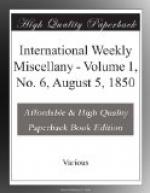The place where this vow was made was a solitary spot in the garden, by a monument of gray marble, overshadowed by dark firs, which the former director of the institution had caused to be erected to the memory of his son, whose premature death was recorded on the stone.
Here the friends met at night, and by the fitful light of the moon they pledged themselves to the rash and fanciful contract, and confirmed and consecrated it the next morning by a religious ceremony. After this they were able to look the approaching separation in the face more manfully, and Edward strove hard to quell the melancholy feeling which had lately arisen in his mind on account of the constant foreboding that Ferdinand expressed of his own early death. “No,” thought Edward, “his pensive turn of mind and his wild imagination cause him to reproach himself without a cause for my sorrow and his own departure. Oh, no, Ferdinand will not die early—he will not die before me. Providence will not leave me alone in the world.”
* * * * *
The lonely Edward strove hard to console himself, for after Ferdinand’s departure, the house, the world itself, seemed a desert; and absorbed by his own memories, he now recalled to mind many a dark speech which had fallen from his absent friend, particularly in the latter days of their intercourse, and which betokened but too plainly a presentiment of early death. But time and youth exercised, even over these sorrows, their irresistible influence. Edward’s spirits gradually recovered their tone, and as the traveler always has the advantage over the one who remains behind, in respect of new objects to occupy his mind, so was Ferdinand even sooner calmed and cheered, and by degrees he became engrossed by his new duties and new acquaintances, not to the exclusion, indeed, of his friend’s memory, but greatly to the alienation of his own sorrow. It was natural, in such circumstances, that the young officer should console himself sooner than poor Edward. The country in which Hallberg found himself was wild and mountainous, but possessed all the charms and peculiarities of “far off” districts—simple, hospitable manners, old-fashioned customs, many tales and legends which arise from the credulity of the mountaineers, who invariably lean toward the marvelous, and love to people the wild solitudes with invisible beings.




